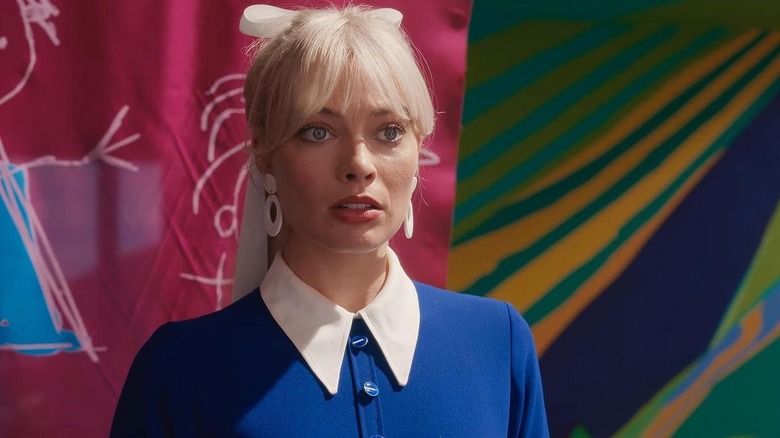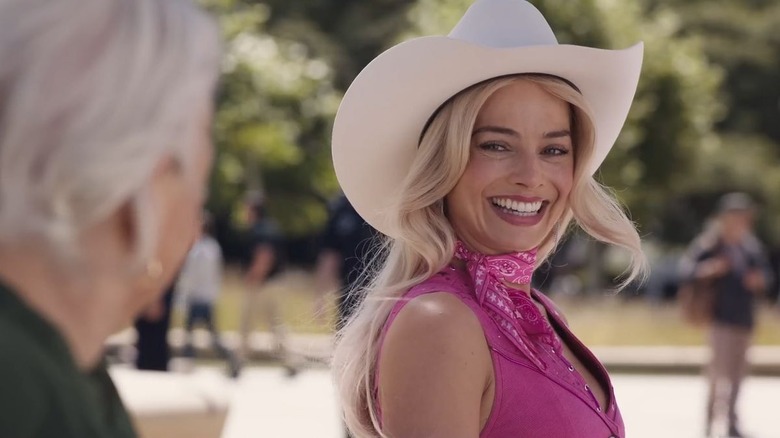Margot Robbie And The Cast And Crew's Loved Ones Made Barbie's Emotional Climax A Reality
This post contains spoilers for "Barbie."
During the emotional climax to "Barbie," Billie Eilish's breathy, dreamlike voice sings "What Was I Made For?" over grainy recordings of brides, mothers, grandmothers, families, and friends sharing tender moments. It's one of the best movie sequences of the year, with Eilish's haunting song capturing Barbie's confusion about her purpose and future.
Vulture's Katie Rife has argued this scene links Stereotypical Barbie (Margot Robbie) to an "intergenerational heritage that she couldn't access as a fictional construct." This collage of close-knit relationships is overwhelming for Barbie, who experiences human feelings for the first time — particularly a mix of painful and cathartic sadness. Ruth Handler (Rhea Perlman), the inventor of Barbie, tells the iconic doll to close her eyes and let the turbulent emotions wash over her.
According to Time magazine, the family images are not random but actual home videos submitted by the "Barbie" cast and crew members, including Robbie's own Super 8 shots. In an interview on TikTok, co-writer and director Greta Gerwig revealed why she wanted to include this real-life footage:
"[F]or me, with something like 'Barbie,' that's such a behemoth of an international brand and icon, it can be something that feels so kind of impersonal that it was a way to be like, this is only ever made by human beings. That movies, dolls, human beings make them. They're not handed down from on high. They're just made. And there was something about Ruth Handler, the inventor of Barbie, this idea that she made the doll Barbie for Barbara, her daughter. And that just human connection I've always wanted to make."
These glimpses into genuine, personal memories illustrate Gerwig's grounded and collaborative filmmaking style. She gives "Barbie" a depth that transcends other corporate movies.
The universal female experience
These snapshots of real women's daily lives not only made me unexpectedly sob into my popcorn, but also reflect on my past, present, and future as a woman — particularly as a female 30-something. I'm now at the age I dreamed about while playing with my Barbie dolls, but like Margot Robbie's Stereotypical Barbie, I don't know how to write my own ending — whether it be starting a family or going on adventures around the world. While Barbie promises little girls that they can be or do anything, the real world crushes you with its social expectations to look and be a certain way. Gloria's (America Ferrara) moving monologue in the film perfectly voices this idea:
"You have to be thin, but not too thin, and you can never say you want to be thin. You have to say you want to be healthy, but also you have to be thin! You have to have money, but you can't ask for money, because that's crass. You have to be a boss, but you can't be mean. You have to lead, but you can't squash other people's ideas. You're supposed to love being a mother, but don't talk about your kids all the damn time."
Watching the women in the movie's climax, I wondered how often they felt like this. I know my external insecurities have followed me my whole life — worries that my hair isn't straight or glossy enough, that I don't have a button nose, or that I'm not shapely enough in all the right places. But viewing the female experience through the prism of cross-generational bonds, "Barbie" reminds us that there is so much more to life than the cultural pressures we put on ourselves. It is the connections we make before we leave this Earth.
"Barbie" is currently playing in theaters.

